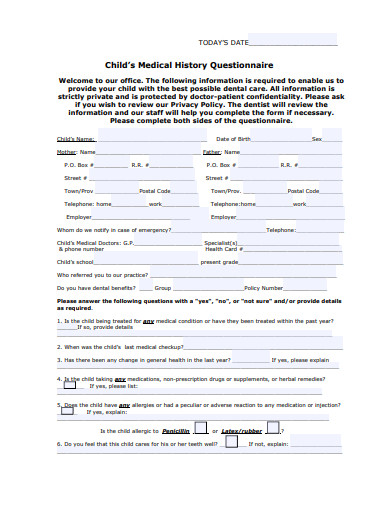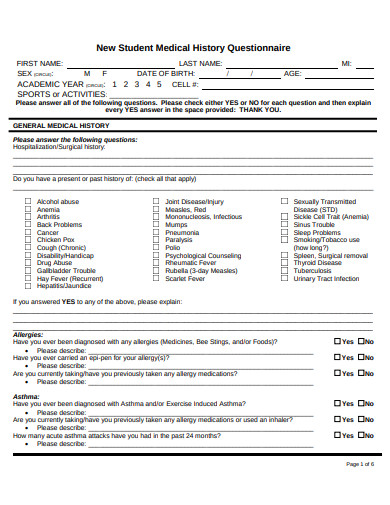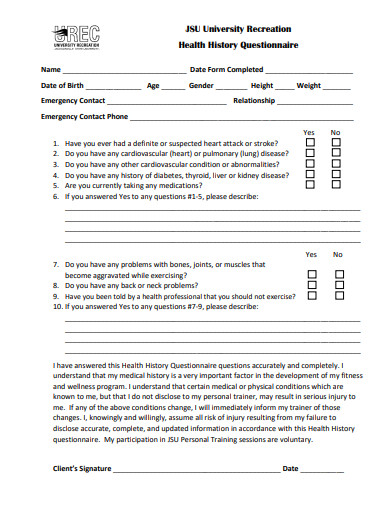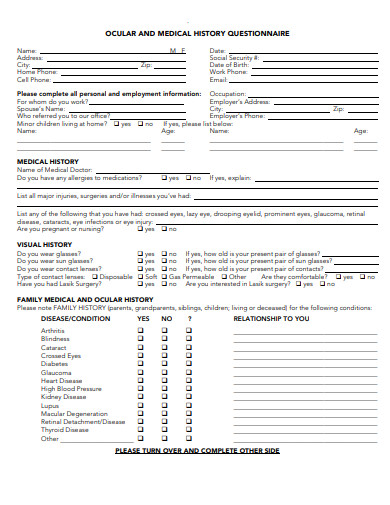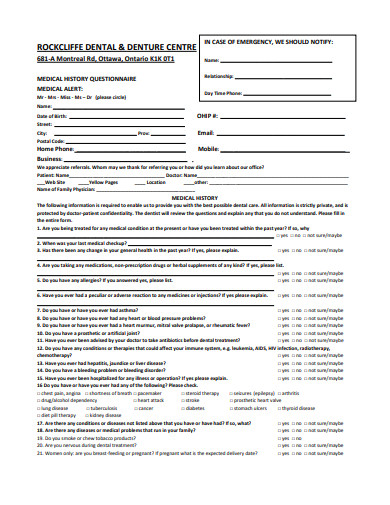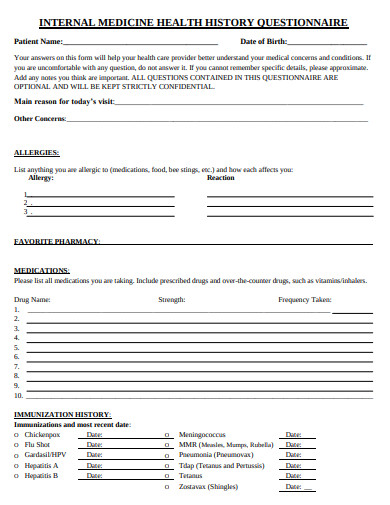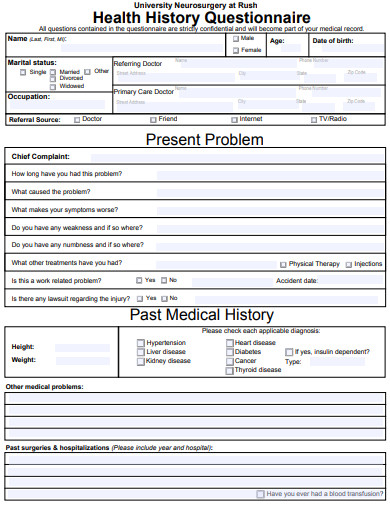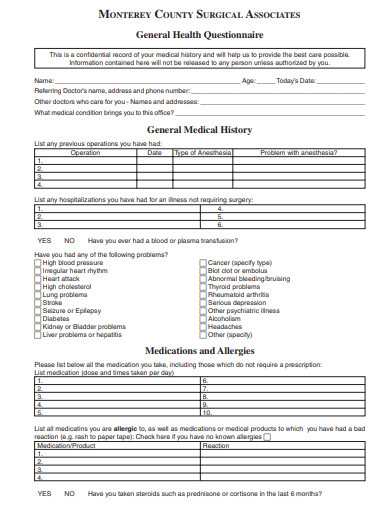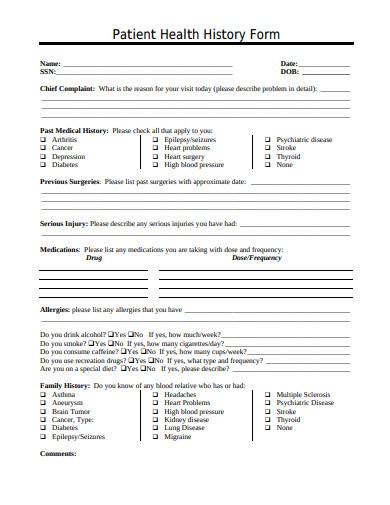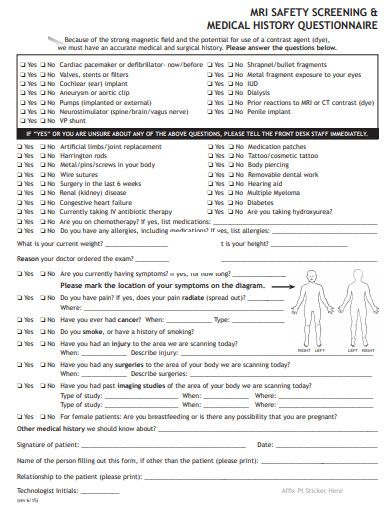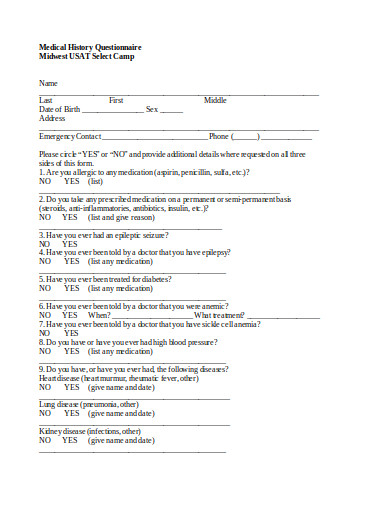10+ Medical History Questionnaire Examples to Download
The medical field and practice are moving from being results-centered to patient-centered. It is one thing to address a health complaint successfully. Patient-personnel interaction, on the grounds of empathy, communication, and friendliness, also influences patient satisfaction and experiential quality of health care. This is a challenge to the medical community that is already burdened with other complexities and prerequisites of the field. With different ways to address this, we can start with a basic element present during the patient-physician interaction: medical history forms.
There are countless diseases that a person can suffer from in his or her lifetime. However, there is only a limited range of reactions that a body can display when something is wrong. Before they can endorse a person for further physical and laboratory tests, health professionals look into a patient’s medical records to identify a health concern. Medical history questionnaires contain a person’s past and present health information. These objective and subjective data help physicians create an effective medical plan of action that can range from treating a patient from infection to managing a life-threatening disease. These plans, when made especially for the patient and not from a generic, one-size-fits-all template, provide a better experience for the patient, too.
Comprehensive health assessment and effective communication between the patient and the health professional are elements for an accurate diagnosis—both help in making decisions regarding the treatment and medical advice. The information in the records helps the health personnel exercise their function better. It is a standard procedure to review the patient’s medical history first before anything. Therefore, medical history questionnaires should be able to capture the patient’s complaints and medical history well. Recording a patient’s medical history usually occurs in the hospital or medical clinic.
Subjectivity Is Not A Crime
A patient’s medical history isn’t the most objective document out there. It shouldn’t just be a long list of signs and symptoms of allergies and diseases. There are perks to gathering subjective and experiential data to supplement the facts of the case. After all, the person who can best describe his or her condition is the patient. The subjective data also helps the health personnel understand what the patient is going through. Objective data are those that can be discerned from medical knowledge of the disease and examination results. Physicians consider the patient’s case in the eyes of the patient and the facts of the case to address the health concern effectively and successfully, with little to no adverse reaction. A good medical history questionnaire is a regulated tango of subjective and objective data.
10+ Medical History Questionnaire Examples
The following are sample templates of medical history questionnaires. While they may seem ready for use, we still have to look into their construction. Medical history questionnaires should be complete and comprehensive. They should function as intended: adequately report the medical condition of a patient.
1. Child’s Medical History Questionnaire
2. Student Medical History Questionnaire
3. University Medical Health History Questionnaire
4. Ocular and Medical History Questionnaire
5. Medical and Dental History Questionnaire
6. Internal Medical Health History Questionnaire
7. Medical Health History Questionnaire Form
8. General Medical Health History Questionnaire
9. Patient Health History Questionnaire Form
10. Safety Screening and Medical History Questionnaire
11. Medical History Questionnaire Example
The Fibers of a Questionnaire
A complete and well-made medical history questionnaire will help the attending health professional perform a medical intervention on the patient. In its basic form, it is a clinical assessment tool. It contains the necessary clues that direct the health personnel on what to look for and where to look. The content of the medical history form can save a patient’s life. On the other hand, neglecting the information in the file can ultimately lead to a patient’s death. What, then, are proverbial fibers that are weaved into a life-saving questionnaire?
1. Patient Profile
The patient’s biographical information is the first part of the medical history questionnaire. This region identifies and traces the subsequent information to the owner of the file. We indicate here the name, age, birth date, nationality, address, occupation, marital status, and the other profile categories of a person. The demographic data that we can extract from this part of the document is also valuable for medical and health-related research when the patient consents to such.
2. Health Concern
In other medical history forms, this section has a dedicated space in the document. The patient pens his health complaint here. We can opt for providing a space for complaint description. We can also provide a list of possible complaints that are common to people. We can add a blank space next to “Others:” when the list of signs and symptoms do not apply to the person’s condition. The patient should also detail when the problem has started and how long it has been going on. This section should be able to give us substantial information about a person’s health concern. This is so that the diagnosis will be accurate and that the treatment plan prescribed is appropriate.
3. Current Medication
This section is discussed separately for emphasis. The updated list of the person’s prescription and supplement medication is not JUST a list of the current drugs they are taking. To a medical professional, the medication list gives clues on what kind of intervention to give the patient that would not aggravate his condition.
For example, a patient’s medical history form indicates that he is taking prescription drugs to manage his enlarged heart condition. Therefore, prescribing drugs that can raise the blood pressure to treat another disease that the person is suffering from is not the best course of action. Medical professionals should exercise caution in prescribing treatment.
4. Health History
The health questionnaire forms should sport a list of his or her allergies, chronic diseases, recent hospital visits, surgical operations, and prescription and supplement medications. This section may also include the menstrual cycle of women. These are telling of the person’s overall health condition. It can also help the physicians decide on the kind of medical intervention that they will prescribe the patient. It can help detect diseases in their early stages, as well as manage the current illnesses.
5. Family History
Whether we like it or not, our family history will determine some part of our lives. It can give clues on our propensity to develop several hereditary diseases that our family tree is prone to. No matter how much we try to mitigate our chances of getting sick, the genes we have may still influence the probability that a disease will manifest in our lifetime. The physicians look at our family history to determine our health risks. By having an understanding of his or her family’s medical genogram, the person can take the necessary precautions to reduce the chance of developing the problem. The family medical history can also help in the diagnosis of diseases and influence the prescription of treatment.
Medical history forms and questionnaires have life-saving merits because of the data they contain. The information found on the document influences decisions for diagnosis, treatment, and medical intervention. It is only crucial that the data in the questionnaires are correct and updated. These forms help medical professionals understand the patient’s plight, as well as empathize with them.



